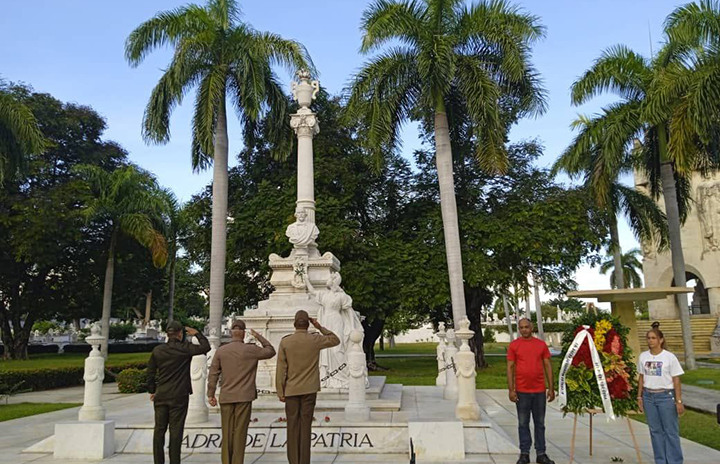Army General Raúl Castro and President Miguel Díaz-Canel today dedicated floral tributes to José Martí, Cuba’s National Hero, on the 156th anniversary of the beginning of the national independence struggle.
In front of the crypt that houses the remains of the most universal Cuban in the Santa Ifigenia cemetery in this city, floral arrangements were also placed on behalf of Esteban Lazo, president of the Parliament, and the Cuban people.
Likewise, students of the Camilo Cienfuegos Military School and cadets of the Inter-arms School of the Revolutionary Armed Forces (FAR) General José Maceo Orden Antonio Maceo, placed an offering on behalf of the Cuban people in front of the funeral monument erected to Carlos Manuel de Céspedes, as a token of the independence legacy started on October 10, 1868.
After the honor guard ceremony, loose flowers were placed at the tomb of Mariana Grajales and at the monolith that guards the ashes of the historical leader of the Cuban Revolution, Fidel Castro.
Miriam González, from Santiago, told the Cuban News Agency that the Father of the Homeland invites to defend, in a permanent way, the achievements of the Revolution.
Céspedes becomes a paradigm of courage, freedom and sacrifice for the common good and equality of people, and is also a guide for the new generations, who constitute the present and future of the socialist homeland, she said.
The ceremony was attended by Beatriz Johnson, First Secretary of the Provincial Committee of the Communist Party of Cuba; Manuel Falcón, governor, leaders of the FAR, the Ministry of the Interior, the Association of Combatants of the Cuban Revolution, political and mass organizations, intellectuals and the indomitable people.
In La Demajagua Farm, in the current province of Granma, the first president of the Republic in Arms freed his slaves inviting them to join his struggle, an action that initiated the revolutionary period of wars for the independence of Cuba.
The Ten Years’ War was the first of the three liberation struggles that took place on the Caribbean island in the second half of the 19th century, with the aim of achieving the nation’s sovereignty over the Spanish metropolis.


